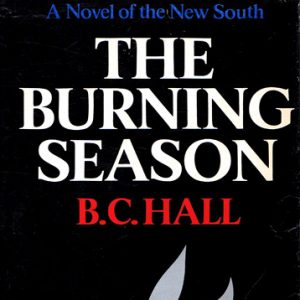calsfoundation@cals.org
B. C. Hall (1936–2004)
Baxter Clarence (B. C.) Hall Jr. was an author and teacher whose novels and books on Southern myth and culture attracted wide readership in the last half of the twentieth century. Hall usually wrote under the name B. C. Hall. His best-known books were the novels The Burning Season, Nashville Lady, and Keepers of the Feast, and three nonfiction works on which he collaborated with writer friends C. T. Wood and Bob Lancaster. He also wrote numerous pulp-fiction novels, sometimes cynically referred to as “bodice rippers,” under pseudonyms like Julia French.
B. C. Hall was born at St. James (Stone County) on June 9, 1936, the youngest of nine children of Baxter Clarence “Bunk” Hall and Hattie Camellia Younger “Dutch” Hall. His father was a cowboy, having broken horses for the army. For the baby’s name, the birth certificate said only “boy child jr.” Hall would tell students that the B. C. stood for “boy child.”
Hall spent most of his childhood in Mississippi County, where Bunk and Dutch were tenant farmers. When he was small, the big family moved to a house in Blytheville (Mississippi County) but continued to work the cotton acreage. He picked cotton alongside his mother, who saved enough money to buy him a manual typewriter when he was sixteen. Hall had decided that he wanted to be a writer like Erskine Caldwell, having acquired paperback copies of Caldwell’s God’s Little Acre and Tobacco Road, which he read behind a cotton shed. He and Caldwell would later become friends. In a jacket blurb for Hall’s first novel, The Burning Season, Caldwell called the book “probably the most satisfying and sensitive outpouring of superb subjective writing since the time of Thomas Wolfe.”
Hall’s father got a job as a school bus driver and janitor at Blytheville High School, from which Hall graduated in 1955. He graduated in 1959 from Henderson State Teachers College (now Henderson State University), where he met Daphna Knight of Searcy (White County). They were married the same year while he was a reporter for the Log Cabin Democrat, the Conway (Faulkner County) daily newspaper, and she a music teacher in North Little Rock (Pulaski County). They had two sons.
Hall was accepted at the Writer’s Workshop at the University of Iowa and received a master of fine arts in 1961. His first and only full-time job after that was as professor of creative writing and American literature at Arkansas Polytechnic College (now Arkansas Tech University). His wit and storytelling skills made him a legendary teacher whose classes were always filled. He retired in 1999.
The Burning Season, a Southern gothic novel about the moral dissipation of a college town in the Mississippi Delta, was published in 1974 to favorable notice. It was his first book with a reputable publishing house—it was distributed by G. P. Putnam’s Sons—but Hall had also been churning out pulp fiction on demand, at a few hundred dollars per novel. It typically took him a week to write a book. He received $400 for his first book, Houseboat Harlot. Writing bodice rippers seemed risky for a professor at a small Arkansas college, so he chose a different pseudonym for each, usually fetching names that he found in the telephone directory, like Hector Lamar and Salus Hartman. He eventually published thirteen of them.
The Burning Season landed him a year’s enlistment as writer-in-residence at the University of Arizona at Tucson. There, he wrote Nashville Lady, about a female country vocalist, which was published in 1976 by Berkley Publishing Corp. Hall’s original title was Bluebells and the King of Pain, and he was furious that the publisher changed it. Hall sold the movie rights to the story under his own title, but the producers lost financing and never made the movie. Keepers of the Feast, a novel about a feud in a rich Texas family, followed in 1980.
In 1984, he collaborated with Bob Lancaster on Judgment Day, an account of the unsolved murder the previous year of the town bully in Skidmore, Missouri. (Hall and Lancaster concluded that a preacher did it.) They received the Edgar Allan Poe Award from the Mystery Writers of America for the book.
In 1992, Hall and C. T. Wood wrote Big Muddy, a book about contemporary life on the Mississippi River. It was inspired by Mark Twain’s memoir, Life on the Mississippi, which recounted his days as a steamboat pilot on the river before the Civil War and his later journey down the river to recapture the memories. The South, which was supposed to be an update of W. J. Cash’s 1941 classic The Mind of the South, came out in 1995 but received disparaging reviews.
When he retired, Hall, an ardent racing fan, moved to Hot Springs (Garland County) to be near the thoroughbred track. He was working on a novel about a nineteenth-century Hungarian racehorse when he died of cancer on November 9, 2004. He is buried in Hollywood Cemetery in Hot Springs.
For additional information:
Barth, Jay. “Book Reviews: The South, by B. C. Hall and C. T. Wood.” Arkansas Historical Quarterly 55 (Summer 1996): 224–228.
Frazeur, Shannon. “Novelist, Professor, Loved by His Students.” Arkansas Democrat-Gazette, November 12, 2004, p. 6B.
Hall, B. C. “When Mississippi County Was the Land of the Pharaohs and Sunset Carson Was King.” Arkansas Times, June 1983, pp. 46–51, 53–56.
Ernest Dumas
Little Rock, Arkansas
 The Burning Season
The Burning Season  B. C. Hall
B. C. Hall 



Professor Hall was my favorite teacher in all of my years of school from elementary to graduate school. He taught creative writing, and he took time to read all our attempts at writing. He was inspiring, encouraging, positive, warm, and caring. He made the class feel like family. He and his lovely wife had us to their home. I have received books published by students in his class. I attended eight colleges, as my husband’s job as an engineer took us to different cities, but Arkansas Tech at Russellville was my favorite because of the staff and Professor Hall.